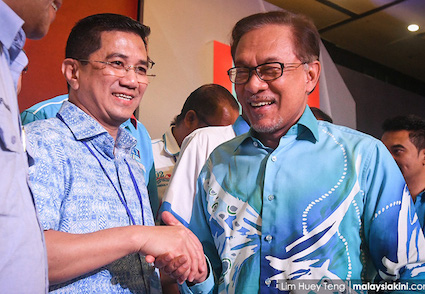Anwar says room for reconciliation with Azmin

(FMT) – PKR president Anwar Ibrahim ended the party’s troubled national congress with a clear message that its members wanted a more disciplined and united party.
Speaking at a press conference at the end of the four-day congress at the Melaka International Trade Centre, Anwar also indicated that there was room for reconciliation in his strained relationship with his deputy Mohamed Azmin Ali.
Azmin had, along with a number of leaders and members, walked out of yesterday’s proceedings over what they said were provocative delegate speeches, and failed to turn up for today’s session.
Anwar appeared to play down the matter by saying first that the question of sacking Azmin did not arise. He said it was only a proposal from the delegates.
“I think even Azmin came out with a more conciliatory statement today that he still respects my leadership as president,” he said, adding that many who left yesterday returned today.
On whether he would reach out to Azmin, he said he had been conciliatory in his speech.
Still, he said, there was a need to take heed of the views of the over 80% of delegates who made it clear they expected a more united and disciplined PKR.
“We will convey this to the leaders,” he said.
On Azmin’s claim that he had broken his promise of ensuring that there were no personal attacks in speeches at the congress, Anwar said he had already informed speakers to avoid doing that.
“But if the delegates say they want leaders to observe discipline and honour their pledges, how do you control that?
“I merely wanted delegates to avoid casting aspersions and personal attacks, which 90% have avoided,” he said.
But Anwar said they “lost control” when the walkout was staged.
“Before that, they maintained that decorum in their speeches but you can’t expect a democratic political party to be just a mouthpiece of leaders.
“They expressed themselves freely.”
On vice-president Tian Chua’s concerns of blind loyalty among members, Anwar said the crowd, who booed him, had an understanding of what was happening.
He said the delegates were not ignorant, having attended state conventions and kept up with the news, and wanted to express their views.
Blind loyalty, he said, depended on which camp someone was in. “But they (delegates) were quite critical, too,” he added, especially those who spoke up on land issues.

